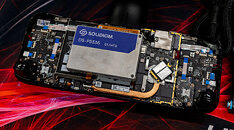- Joined
- Oct 9, 2007
- Messages
- 47,680 (7.43/day)
- Location
- Dublin, Ireland
| System Name | RBMK-1000 |
|---|---|
| Processor | AMD Ryzen 7 5700G |
| Motherboard | Gigabyte B550 AORUS Elite V2 |
| Cooling | DeepCool Gammax L240 V2 |
| Memory | 2x 16GB DDR4-3200 |
| Video Card(s) | Galax RTX 4070 Ti EX |
| Storage | Samsung 990 1TB |
| Display(s) | BenQ 1440p 60 Hz 27-inch |
| Case | Corsair Carbide 100R |
| Audio Device(s) | ASUS SupremeFX S1220A |
| Power Supply | Cooler Master MWE Gold 650W |
| Mouse | ASUS ROG Strix Impact |
| Keyboard | Gamdias Hermes E2 |
| Software | Windows 11 Pro |
With a simple mod, Storage Review got a Valve Steam Deck handheld gaming console to work with the world's highest capacity SSD, the mammoth 61.44 TB variant of the Solidigm D5-P5336. At its core, the Steam Deck is a highly compacted x86-64 PC powered by an AMD Ryzen mobile processor that features an industry standard PCIe interface, which it uses for an onboard M.2-2230 NVMe SSD. Storage Review used a simple adapter that converts M.2 to U.2—the interface of the D5-P5336—and the Steam Deck just worked.
Out of the box, the Steam Deck uses Valve's SteamOS, although it's fairly straightforward to install Windows, and get the Steam application to present its user interface (with which you can play just about any Windows PC game that's not yet available on SteamOS). A quick benchmark with KDiskMark (the Linux analog of CDM) sees the D5-P5336 post sequential read speeds of 3.6 GB/s, with 2.8 GB/s sequential writes. There's a catch here, though. It's not practical to lug the D5-P5336 along with your Steam Deck, the Solidigm drive is designed for servers, and besides the U.2 connection, requires a power input that a U.2 enclosure can provide.



View at TechPowerUp Main Site | Source
Out of the box, the Steam Deck uses Valve's SteamOS, although it's fairly straightforward to install Windows, and get the Steam application to present its user interface (with which you can play just about any Windows PC game that's not yet available on SteamOS). A quick benchmark with KDiskMark (the Linux analog of CDM) sees the D5-P5336 post sequential read speeds of 3.6 GB/s, with 2.8 GB/s sequential writes. There's a catch here, though. It's not practical to lug the D5-P5336 along with your Steam Deck, the Solidigm drive is designed for servers, and besides the U.2 connection, requires a power input that a U.2 enclosure can provide.



View at TechPowerUp Main Site | Source



